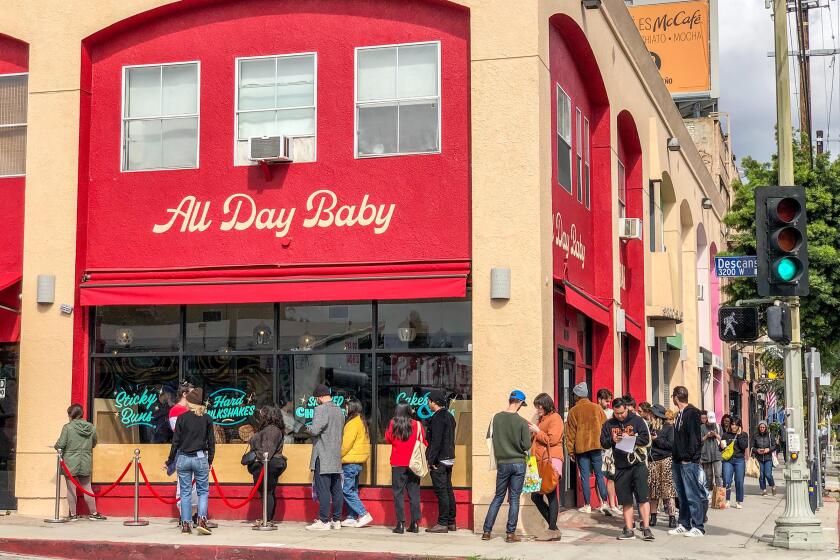Discovering Good Shine
Serious devotees of Chinese food in America mention Monterey Park with the same hushed reverence afforded New York City’s Chinatown and Grant Avenue in San Francisco. Even a casual stroll in Monterey Park might yield a discovery.
A great discovery is the Good Shine Kitchen. The restaurant is squeezed in between an auto-parts store and a laundromat and has all the charm of a North Carolina barbecue pit.
“Good Shine” is a transliteration of gu shang, which, in Taiwan’s Hokkien Chinese dialect, means motherland. Their motto is “be of good cheer.” The restaurant is the creation of Leonard Hsu, poet, musician, conductor, entrepreneur and Taiwanese patriot. Hsu owns a bakery, where he prepares products for his restaurant, and a food shop, where he sells delicacies prepared in his restaurant.
Taiwan was a Japanese colony for 60 years until 1945. The older generation was educated in Japanese, and this bicultural mixing is often demonstrated in its cuisine. “Authentic Taiwanese food is a very important part of our culture,” Hsu boasts, “and I wanted to bring it to America.”
Three Cups Chicken
So he did. Sam-poe-ke ($8.80), for example, is a cross between a Japanese teppan and a Chinese clay-pot dish. The name refers to its ingredients and means three cups chicken.
The chicken is deep-fried in oil and further browned in a wok. After a thorough draining, it is placed in a clay pot with plenty of sliced ginger, several whole cloves of garlic and a bit of sugar. Sesame oil, rice wine (sake) and a kind of Japanese soy paste are then added slowly. The mixture is reduced with the chicken to a rich, deep brown glaze. To prevent drying out, rice wine is poured in at intervals. The result is wonderfully appealing.
Some specialties are quite simple. One of the best is a rice bowl topped with minced pork, radish, mushroom and Japanese pickles: rice burger ($2.50).
Many dishes are unusually named. Long life egg roll ($3.60) is really called chicken roll in Chinese characters. (Hsu didn’t want to call it chicken roll in English because it actually contains no chicken.) It is a long ground pork roll wrapped in dried tofu skin; it looks like a chicken neck--but it certainly doesn’t taste like one.
The restaurant smokes its own chickens right out back, after hours. The night chef, Hsu’s brother, uses tea leaves, sugar and a touch of camphor. He also smokes his own duck. Both are sensational.
Traditional Snacks
The restaurant is open until 4 a.m., when Taiwanese come in to eat traditional snacks. Bi-ko ($2) is a sticky rice dumpling with a filling of pork, mushroom and taro, blanketed in a pale pink sauce made from crushed red pepper. Oa-gwey ($1.60), or bowl cake, is a fat rice flour cake unmolded by inversion. The most famous dish is o-a-jen ($2.80), or oyster pancake. This is a sticky rice flour and egg omelet loaded with little river oysters and served with a pungent red sauce.
Another distinctive specialty is ngo-bi, or five flavors, a tomato-base sauce with cilantro, green onions, crushed red pepper, garlic and ginger. The noodle dishes and soups are all in the $3 range, and some of the best are spiced salt pork chop noodle ($2.80) and da-a-me ($3.20), a meatball stew with Japanese fish cakes.
The decor is modest and the tables are ramshackle. The white plaster walls are filled with Chinese poetry, graffiti and even musical notation. Until recently, the restaurant had Christmas decorations up but the city ordered them taken down. Still the festive spirit is undampened.
The restaurant is a cheerful place, but one can’t help but feel that it won’t be too long before Hsu is knocking down the neighboring walls, moving carburetors and dismantling washing machines himself.
Good Shine Kitchen, 235 S. Garfield Ave., Monterey Park. (818) 572-9666. Open from 11 a.m. to 3 a.m. daily, until 4 a.m. on Friday and Saturday. No credit cards accepted.
More to Read
Eat your way across L.A.
Get our weekly Tasting Notes newsletter for reviews, news and more.
You may occasionally receive promotional content from the Los Angeles Times.










